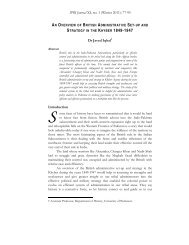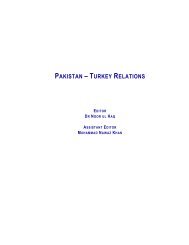120 Whither Kashmir? (Part II) - Islamabad Policy Research Institute
120 Whither Kashmir? (Part II) - Islamabad Policy Research Institute
120 Whither Kashmir? (Part II) - Islamabad Policy Research Institute
Create successful ePaper yourself
Turn your PDF publications into a flip-book with our unique Google optimized e-Paper software.
64 IPRI Factfile<br />
interests — which has raised Pakistan’s level of confidence in its dialogue<br />
with India.<br />
In any case, with the ice having been broken and with both foreign<br />
secretaries having demonstrated their ‘nationalist’ credentials, they can<br />
hopefully go back to resuming meaningful negotiations. It is Pakistan’s<br />
strong belief that the only agreed upon mechanism, to which both<br />
countries have been wedded, is the composite dialogue process. India,<br />
however, fears that this structured ‘format’ makes an exchange on<br />
<strong>Kashmir</strong> unavoidable and is therefore seeking to sidestep it.<br />
This is neither feasible nor advisable. The disputed nature of<br />
<strong>Kashmir</strong> is a matter of record for not only the United Nations but in<br />
terms of numerous bilateral understandings and agreements. Pakistan<br />
may over the years have extended more than diplomatic and political<br />
support to the <strong>Kashmir</strong>is, but India is aware that no amount of external<br />
assistance can keep a liberation movement alive in the face of brutality<br />
unless it enjoys considerable domestic support.<br />
India must also recognise that even a complete end to Pakistan’s<br />
support to the <strong>Kashmir</strong>i cause will have, at best, only marginal impact on<br />
the freedom movement, which will continue to inflict enormous costs on<br />
India. More importantly, as long as it keeps millions of <strong>Kashmir</strong>is<br />
suppressed, India will never achieve the recognition it merits.<br />
Pakistan, too, must review its <strong>Kashmir</strong> policy. We have engaged in<br />
disastrous adventures to convince India to abandon its claim. None of<br />
them have advanced the <strong>Kashmir</strong> cause, or even marginally improved the<br />
lives of its people. In fact, this policy has had a deeply debilitating impact<br />
on our national economy while seriously distorting our psyche.<br />
If all this is true, is it not incumbent upon both sides to recognise<br />
the urgency of a solution? Neither India’s continued occupation of<br />
<strong>Kashmir</strong>, nor Pakistan’s overwhelming preoccupation with ousting it, has<br />
earned either country any kudos. In fact, most foreign powers are tired of<br />
being asked to take sides in a wrangle the world has lost interest in,<br />
except when the temperature rises enough to raise the spectre of a nuclear<br />
confrontation.<br />
The latest evidence of this ennui was the silence maintained on the<br />
issue during Prime Minister Manmohan Singh’s visit to Riyadh. Not only<br />
did <strong>Kashmir</strong> fail to find any reference, but Singh found the occasion<br />
much too opportune to not berate Pakistan with unusual vehemence.<br />
Many Pakistanis were disappointed by references to their ‘strategic<br />
ties’ but this was inevitable given the two countries’ growing




